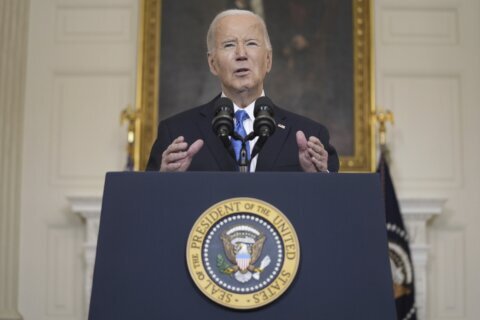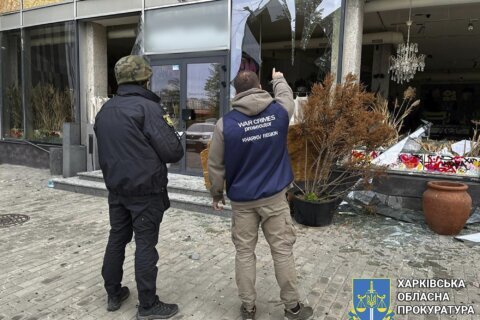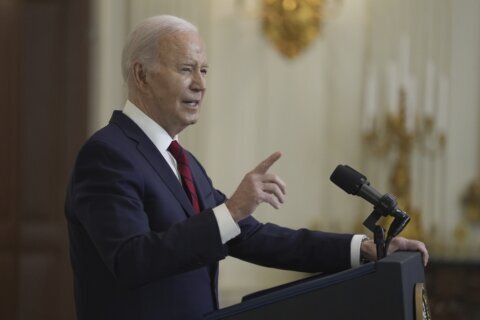OZERA, Ukraine (AP) — Tetiana Boikiv watched from the doorway of the cellar as the Russian soldiers questioned the man she called her big, big love. They took him away, and she never saw him again.
While it is the atrocities in the nearby town of Bucha that have captured the world’s attention, they are part of a trail of violence that spread far and wide, often under the radar of prosecutors, to ordinary villages like Boikiv’s, a half-hour north. Much of the violence was systemic, not random, conceived and implemented within the command structures of the Russian military, an investigation by The Associated Press and the PBS series Frontline found.
___
This abridged story is part of an AP/FRONTLINE investigation that includes the War Crimes Watch Ukraine interactive experience and the upcoming documentary “Putin’s Attack on Ukraine: Documenting War Crimes,” which premieres 10/9c Oct. 25 on PBS.
___
Troops were instructed to block and destroy vestiges of “nationalist resistance,” according to Russian battle plans obtained by the Royal United Services Institute think tank in London. These cleansing operations — zachistka, in Russian — took on a sharper edge as the line between civilians and combatants blurred.
Ukraine has made it breathtakingly easy for anyone with a cell phone connection to report the position of Russian troops, and many civilians do. As Russian soldiers fight to suppress what has effectively become a crowdsourced resistance, they’ve swept up many civilians who have done nothing at all.
Ukrainian prosecutors say they will address every crime committed in this war, but they are scrambling to triage more than 40,000 war crimes investigations. That left Boikiv largely on her own to find her missing husband, Mykola Moroz, known to friends as Kolia.
They’d met at a botanical garden on a church outing for singles. Boikiv, also known as Tania, moved to the village of Ozera just a few months before Russia’s invasion to build a new life with Kolia.
Kolia got up before dawn to bring Boikiv fresh flowers from the fields. When they were apart, he sent her photos of flowers on her phone.
He liked to collect small, beautiful things — stones, stamps, postcards, pieces of glass. In the evenings they’d take turns cooking. He baked better apple pie than she did.
“Once Kolia said to me, Tania, what’s the point in living for oneself? It’s when you have somebody next to you, you can feel happy,” she recalled.
After the Russians left, word went round that a priest from the village of Zdvyzhivka had photos of people who’d been killed.
Father Vasyl Bentsa had wanted to document the bodies of five unknown men found in a back garden of one of the ritziest houses in town. So he had taken photos and then buried the men at edge of a forest.
Boikiv went to see him, and scrolled through the images of the dead on his phone. At the third man, Boikiv froze.
There was Kolia, bloodied and beaten but intact. His hands were curled into fists and his body was fixed in a fetal position. The joints of his legs were bent at strange angles. One eye was swollen shut, and his skull had been crushed.
“My Kolia! Kolia!” she cried.
Father Bentsa told her police had exhumed Kolia and four others from their common grave six days earlier. But Boikiv still didn’t know where to find him.
Kolia had been abducted the day after drone footage shows a Ukrainian rocket hit Russian artillery munitions, with such accuracy that Ukraine had likely gotten information about the Russian position, from military intelligence, a drone — or from a civilian spotter. Cell phone tower records for Kolia’s mobile phone numbers obtained by The AP show that his phone was last active on Feb. 25 — making it extremely unlikely that it was Kolia. But the Russians swept him up anyway.
Boikiv’s first stop in her effort to find Kolia was the Bucha morgue. But Kolia’s name wasn’t on the lists of bodies there.
Three large refrigerated trucks were parked outside. Boikiv and her friend went through dozens of bodies and peered at the dead faces. They did not find Kolia.
A few days later, she heard two unidentified bodies from Zdvyzhivka had come in. By the time Boikiv got back to Bucha, the bodies were at the bottom of a stack of body bags in a refrigerated truck about to leave for a nearby town.
Boikiv began to weep, and threatened to climb in the back with all the dead people. She couldn’t let Kolia slip away again. The driver made space for her in the cab.
When the truck was unloaded, Boikiv peered in at the corpses from Zdvyzhivka. They were in such poor shape that it was hard to be sure. Kolya opened the mouth of one and looked at the teeth. It wasn’t him.
Then she spotted Kolia’s shoe peeking out from a partially open bag. She recognized her husband by the shape of his skull, his beard and his fillings.
“They took my big love,” she mourned.
All that’s left now is the search for justice. The only official documentation Boikiv had was a slim strip of paper that said her husband died of multiple gunshot wounds on March 25, 2022. Boikiv doubted it was bullets that killed him.
She gave a statement to Ukrainian authorities, but she said she hasn’t heard from anyone since. Nor has anyone asked her to identify the soldiers who took him.
She is not optimistic that the people responsible for her husband’s death will be identified and punished. Nor is she convinced it would matter much.
“You will not bring him back,” she said.
She sat at home in the darkening light surrounded by the bed she’d brought to share with Kolia, the water from the well he dug, the little blue and white plastic butterflies Kolia pinned to their buckling wallpaper.
“I understand that everything is in the hands of God,” she said. “And the time will come when people will be punished for this. The judgment day is awaiting them.”
___
Frontline producers Tom Jennings and Annie Wong, co-producer Taras Lazer and AP reporter Solomiia Hera contributed to this report.
To contact AP’s investigations team, email investigative@ap.org
Copyright © 2024 The Associated Press. All rights reserved. This material may not be published, broadcast, written or redistributed.







